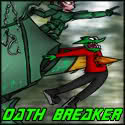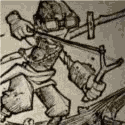|
Makes plenty, to me at least. And we agree on at least one emphasis: No goddamned railroads. The players are not there to be part of your story. They are there to MAKE a story.
|
|
|
|

|
| # ? May 9, 2024 15:18 |
|
A very helpful thing I've found about GM'ing is not so much where the players are going but what the NPCs they encounter have been up to. Having an idea of an NPCs background (What they've done, where they've been, what prejudices they might have, other NPCs they know) helps me out a lot because it gives me a compass for them. Having their behavior be logically consistent also makes them feel a lot more real and I think the players find it fun to know that. Having a bad guy do X simply because X needs to be done is kind of lame. It's a lot more fun, especially as a player, to know he did X and think 'What is this getting him?'. I tend to play in sleuth-y/political genre games so your mileage may vary but having well fleshed-out and memorable NPCs is a big highlight and that's where the vast majority of my games homework comes from.
|
|
|
|
|
DivineCoffeeBinge posted:I'm kind of the opposite of MohawkSatan; As a GM I did virtually no pre-planning in terms of storylines and adventures. In my free time I did a lot of stuff that could be considered "homework" - I built NPCs, worked on setting details, and the like - but I never wrote out an actual adventure. Instead I just tried to have as good a sense of the setting and the goings-on as I could, so that when I asked my players what they wanted to do, I could have a good idea of how people and things might react and change in response to their answers. This is my style, too. I love worldbuilding. I'll lay out detailed settings, factions, and potential conflicts. Then I let my players interact with the world as they see fit. I'll usually have a beginning narrative to get the players involved, but beyond a certain point, it's all them. I'll have the world continue to move in the background with the conflicts I've already planned out before. If the players want to take part, they can. Encounters are mostly done with a central idea, some cheat sheets, and a lot of adjustment on the fly to suit difficulty. I don't put a lot of thought into most encounters, but I will make a set piece every once in a while.
|
|
|
|
Don't be afraid to say, "Oh, I didn't plan for that. Take a ten minute bathroom, smoke, and/or snack break while I stat some stuff." Just don't make it a habit. If you do, you've either got players who're deliberately being difficult or you are clinically incapable of figuring out what your players want.
|
|
|
|
...
Nostalgia4ColdWar fucked around with this message at 02:48 on Mar 31, 2017 |
|
|
|
50 Foot Ant posted:A good way to do that is to tell them: "Man, I didn't see that coming! That was a slick move!" before telling them you have to adapt real quick. It gives them a feeling of accomplishment. This. Let them know you appreciate their lateral thinking and they'll do it more often, just to see if they can keep catching you off-guard... and in my experience, they'll be a lot more forgiving when you pull something they didn't see coming.
|
|
|
|
I'm running a FATE-like homebrew game, and while it's going good for the most part and they say they are having fun with no complaints yet, they are still acclimating to how the system works vs their usual games that are more like D&D. Particularly, I'm having a hard time coming up with a way to prompt them into making a declaration to serve as an example of how it can work for them in play. There have been opportunities, and I have prompted them with things like "any more on <secret thing> will require a declaration attempt", but so far none have taken the shot. Anyone have any experience with a general way to "telegraph" that a particular declaration would be useful, without just straight up telling them "declare this and this thing you want will happen", or hinging on situations that are really covered by regular skill checks and not declarations? I'd really like to see them using declares more. They aren't using their FP at all currently, and I have tried to be particularly generous to ward off the hoarding tendency as they've gotten 7 in the last one and a half sessions. Supposedly they understand the examples, and have been on the verge of declarations (and suggest a few things declarationlike, but are mundane, uninteresting and expected so I just make it happen, but it means they're thinking about this kind of stuff!) but seem hesitant to actually SPEND the FP to do anything with them thus far as they keep backing down when I prompt them to do so for what they are asking about whether something about <some secret thing> is true. As a note if it matters: In this implementation, generally the things termed as "Declarations" always require a Fate Point and a skill roll, because I generally interpret the rolls beyond just a simple pass/fail (each shift above the target is usually more informative, "stickier" or of increased intensity of effect), and I don't want them trying to declare everything on everything without regard for the background consistency or having to redo lots of intrigues that they may not be fully aware of yet. (Though if they get a really awesome idea, I'll be going with that obviously!) They may also end up more far-reaching than they are in other games, so I want to keep them gated by FP at the moment.
|
|
|
|
I know nothing about the FATE system, but if they're not taking the heavy-handed hints maybe you could try saying, "Because this is a really dramatic moment, any declarations made [won't cost a FP]/[will have increased chance of success]/[will be particularly effective]" ? When my group first started 4E they didn't seem to get that encounter powers, while technically limited, were supposed to be used all the time. It was getting to be a problem because they were limiting themselves to boring At-Will slug fests, so I temporarily let them have two uses of each encounter power as long as they used one on their first turn. That sort of broke the ice and allowed me to remove the bonus later on.
|
|
|
|
Fate Points work more like D&D 4e Action Points, but you can also create plot or NPC/organization personality and such with them as a player. Still sounds like a good idea though to possibly have a special "Use it or lose it tonight!" Fate Point just for declarations for a session or two. It's probably one of the more "arcane" parts of it if you're used to something where you're solely on a "ask the DM what X is" basis rather than having the option to add "X is like this!" yourself as a player. They haven't even used them for dice roll bonuses yet though, and one of them was even getting close to taken out in a conflict, so that alone is probably not the issue.
Kylra fucked around with this message at 18:37 on Dec 22, 2011 |
|
|
|
I'm uncreative, bad at improvisation, and not very funny--the three worst things a DM can be. My sole experience as DM is a session of 4E I ran for my little sister. And now I'm going to try running 3.5 for my friends, who will actually know when I screw up. (I do love 4E, but I'm far more comfortable with the mechanics of 3.5, and 4E doesn't have all the sourcebooks I need for this.) It's a naval/maritime campaign ( ), with emphasis on ships, underwater dungeons, and uncharted islands. I'm hoping the narrow theme will let me focus my meager creativity and craft fabulous, exciting encounters and plot hooks. If I make the dungeons cool enough and write up enough contingency plans, maybe the players won't notice when I start stumbling around in the dark. ), with emphasis on ships, underwater dungeons, and uncharted islands. I'm hoping the narrow theme will let me focus my meager creativity and craft fabulous, exciting encounters and plot hooks. If I make the dungeons cool enough and write up enough contingency plans, maybe the players won't notice when I start stumbling around in the dark.Obviously, I have a lot of concerns. The first is that I was thinking of implementing a lot of alternate/house rules: traits, flaws, and alternate death/dying and massive damage mechanics from Unearthed Arcana, passive checks from 4th edition, and houseruled underwater spellcasting rules, to name a few. But I'm questioning whether it's wise to implement these rules when even normal underwater and ship combat has so many complications. Will it scare my players away if they see a huge list of potential alternate rules in the information sheet, even if they're allowed to vote on them ahead of time? Should I just run normal rules to make things go more smoothly? I'm going to run a few test combats with the alternate rules with myself and a couple friends to see how they play out, but I'm concerned they won't give me real feedback. Second, a ship needs a crew. But it's only a mode of transportation, and most of the plot-relevant combat will take place underwater or on land. To keep the PCs from having to specialize their builds and memorize ship combat rules, I have a crew of five named and combat-worthy NPCs (Captain, Doctor, Boatswain, Ship Mage, and Artillerist), three named but noncombatant NPCs, and eight generic commoner/expert deckhands. The combatants are all at or below the PCs' level, but they're wholly dedicated to utility and keeping the ship afloat. My thought is that the PCs can command the NPCs in combat if they so choose; otherwise, they'll just run around doing first aid, protecting the hulls, etc., and not having a real influence. They're not there to be part of the story or take the spotlight from the players, they won't accompany the players on off-ship adventures (unless specifically asked), and they don't get any prestige; they're just to keep the ship mechanically believable and give the players a recurring cast during travel. Is there anything else I can do to reinforce this message, so they don't think I'm trying to play a bunch of DMPCs? Finally, there's the issue of the captain. The NPC captain can either be removed from her position, making her just the ship owner, or left in command. In the worst-case scenario, every player will want to be the captain. To keep jealousy from springing up, I want to emphasize that ship travel will only take up about one-fourth of the campaign, and dictate that a captain has to have ranks in Profession (Sailor), as well as a working knowledge of ship combat mechanics from the player's side. Whether or not a player decides to take the role of captain, the party will have literally the same level of control over the ship--they'd just be telling the captain to ram the enemy ship rather than making the roll to order the crew themselves. Does this seem like a good way of handling things, or does it sound petty and un-fun? Sorry for the wall of text. The advice you've all given to other DMs has been great, so it seems like this is the best place to ask.
|
|
|
|
I've never played 3.5! I'm going to pretend it's a generic indy game I've never heard of and give you advice based on that. Hopefully the more experienced will jump in if I'm totally wrong. Ratspeaker posted:I'm uncreative, bad at improvisation, and not very funny--the three worst things a DM can be. I wouldn't call them the worst. I think you have the right idea with a specific theme helping you come up with ideas. Don't lay this trip on yourself about being "uncreative." Remember that great artists steal and that clichés are popular due to their resonance (or, in improv terms, your first idea is usually your best idea). Watch Errol Flynn movies and Pirates of the Caribbean, read Treasure Island and Gideon Defoe's Pirates! books, you'll have a great time and get a million ideas. (You should also read Moby Dick, because every literate anglophone should, but you may not have enough time before the game starts!) quote:The first is that I was thinking of implementing a lot of alternate/house rules: traits, flaws, and alternate death/dying and massive damage mechanics from Unearthed Arcana, passive checks from 4th edition, and houseruled underwater spellcasting rules, to name a few. But I'm questioning whether it's wise to implement these rules when even normal underwater and ship combat has so many complications. Will it scare my players away if they see a huge list of potential alternate rules in the information sheet, even if they're allowed to vote on them ahead of time? Should I just run normal rules to make things go more smoothly? I'm going to run a few test combats with the alternate rules with myself and a couple friends to see how they play out, but I'm concerned they won't give me real feedback. I would absolutely start the game only with those house rules which make things simpler (passive checks may qualify?). Don't give any of the players, including yourself, too many balls to juggle at once. Feel free to either monitor carefully those areas you were considering having more detailed subsystems, or gloss over them entirely until you think the time is right for a session that uses them. quote:Second, a ship needs a crew. But it's only a mode of transportation, and most of the plot-relevant combat will take place underwater or on land. To keep the PCs from having to specialize their builds and memorize ship combat rules, I have a crew of five named and combat-worthy NPCs (Captain, Doctor, Boatswain, Ship Mage, and Artillerist), three named but noncombatant NPCs, and eight generic commoner/expert deckhands. That's a large number of statted NPCs. How many player characters will there be on the boat? If the players don't want to learn ship combat rules, you could always just, you know, not use those rules. Assume all ship battles will end in boarding and hand-to-hand fights, and just give them choices ahead of time that change features of those hand-to-hand encounters. That way you can even let them assign themselves positions on the boat. Tell them it's just for color, no skills necessary, then read off a long list of nautical jobs, and see if any of them say "I want to be the guy in the crow's nest!" or "Cabin boy?! Best movie ever!!" For NPCs:
You'll naturally find some of these characters will matter more to the players and story than others. Develop the ones who end up getting the most screen time. quote:Is there anything else I can do to reinforce this message, so they don't think I'm trying to play a bunch of DMPCs? I think the ultimate way to make sure NPCs are not at the center of dramatic attention is to make sure that they never get their own scenes and they never get to roll. That is, if PCs aren't rolling against them, you just decide if they succeed, fail, or, more importantly, what they need from the PCs in order to succeed. Works for supporting characters and villains alike. But of course that's the absolutist position which you don't need to take on whole-hog. I'd make a mental note whenever you start thinking, "Oh yeah, now this guy will try to do this thing on-camera." quote:Finally, there's the issue of the captain. The NPC captain can either be removed from her position, making her just the ship owner, or left in command. In the worst-case scenario, every player will want to be the captain. To keep jealousy from springing up, I want to emphasize that ship travel will only take up about one-fourth of the campaign, and dictate that a captain has to have ranks in Profession (Sailor), as well as a working knowledge of ship combat mechanics from the player's side. Whether or not a player decides to take the role of captain, the party will have literally the same level of control over the ship--they'd just be telling the captain to ram the enemy ship rather than making the roll to order the crew themselves. Does this seem like a good way of handling things, or does it sound petty and un-fun? I'm a big fan of intra-party conflict, and arguments about what the ship will do sound dramatic and cool to me. That said, I'm not sure what kind of system to use for it. In situations where there's lots of time ("Where shall we sail next, captain?"), you could believably have discussions, dialogues, votes and the like. Maybe in fights and other desperate times, they can always try to countermand, dispute or ignore the captain's orders, but it'll delay the ship in ways that will have consequences, so they can choose whether it's really worth it to challenge authority right now, instead of later? Obviously, placing character-skill based restrictions on captaincy goes against my outline above.
|
|
|
|
On that NPC-related note, Rob Donoghue (Dresden Files et al.) posted some cool GM advice recently.quote:Want a quick litmus test for the health of your game? Ask one of your players how many NPCs they can name. If that number can be counted on one hand, that's a red flag.
|
|
|
|
quote:I think you have the right idea with a specific theme helping you come up with ideas. Don't lay this trip on yourself about being "uncreative." Remember that great artists steal and that clichés are popular due to their resonance (or, in improv terms, your first idea is usually your best idea). Watch Errol Flynn movies and Pirates of the Caribbean, read Treasure Island and Gideon Defoe's Pirates! books, you'll have a great time and get a million ideas. (You should also read Moby Dick, because every literate anglophone should, but you may not have enough time before the game starts!) I have been reading a lot about boats, sea formations, and 1400s-era voyages. Doesn't help story-wise, but it gives me ideas for dungeon and encounter settings. The literature and movies come next to help me weave a story into this mechanically rich but boring world. As for the house rules, the ones I definitely want to put in are traits/flaws, passive checks, and some kind of injury system. Especially the last one, because it gives combat dramatic and concrete repercussions that don't actually do much to change the difficulty. Speaking of which, if anyone has a good critical hit table (for any system), mine is pretty lame right now and I've been looking for more references. quote:That's a large number of statted NPCs. How many player characters will there be on the boat? If the players don't want to learn ship combat rules, you could always just, you know, not use those rules. Assume all ship battles will end in boarding and hand-to-hand fights, and just give them choices ahead of time that change features of those hand-to-hand encounters. That way you can even let them assign themselves positions on the boat. Tell them it's just for color, no skills necessary, then read off a long list of nautical jobs, and see if any of them say "I want to be the guy in the crow's nest!" or "Cabin boy?! Best movie ever!!" Stormwrack laid out the mechanics for ship combat, and they did it in such a convoluted yet beautiful way that I have a hard time just ignoring them. They even provided a chapter of simplified rules, which is probably as free-form as I'd want to go. I don't think my players would enjoy being told that they can't intercept the ship before it boards them, since they're big fans of crazy alternate solutions and at least one of them is probably going to be a blaster or archer. The thing is, right now, the plan is to treat the ship is more of a side adventure than anything. Like traveling along a road and finding a random encounter, just using a method of transit that makes things a thousand times more mechanically complicated. But a caravel (which seems to be the best boat for the campaign) needs 7 people on deck to make use of its full speed, and I'm only accepting 6 players. And on top of that there's the captain, navigator, artillerist, doctor, boatswain-- Stormwrack was very helpful in laying out the jobs that need to be filled for a successful voyage. Each of the specialized jobs requires something like Knowledge (Geography) or Craft (Sailmaking), and even the common deckhands need ranks in Profession (Sailor). And I need a cleric to Create Food and Water to make long journeys logistically feasible, since a caravel can't carry large amounts of cargo. And I don't want players to have to sacrifice their builds to achieve this; I'm sure you're familiar with the grognards.txt rant about having to take Skill Focus (loving the Dog) at the proper level or risk ruining your character path, and having to stat themselves as crewmembers would probably use up the necessary feat slot. The current crew isn't set in stone, and if a player says they really want to build their character to be the perfect lookout or artillerist or ship mage, I'll definitely take out whatever NPC pertains to that role and let them fill it instead. (At this point, I should mention that the players who've expressed interest in the game so far are mostly from my usual gaming group, where games by the usual DMs commonly include a few dozen different named, statted, and plot-relevant NPCs capable of going toe-to-toe with the PCs. That's a convention I'm trying to break away from, while still providing them with an interesting background cast.) I know the popular opinion in this thread is to just ignore the mechanics and do whatever's fun, but I have a very crunchy mind, and even though I can ignore the rules in casual and unexpected situations to make things more interesting, I need a recurring background element like a ship to make logical sense. Even if the players don't realize that they should have run out of food a week ago, or that they should need to make sailing checks to turn the ship, or that the dormitory area is too small to house the crew, it'll drive me crazy. quote:Ahead of time, get/make a list of just names it would make sense for pirates to have. quote:I'm a big fan of intra-party conflict, and arguments about what the ship will do sound dramatic and cool to me. That said, I'm not sure what kind of system to use for it. In situations where there's lots of time ("Where shall we sail next, captain?"), you could believably have discussions, dialogues, votes and the like. Maybe in fights and other desperate times, they can always try to countermand, dispute or ignore the captain's orders, but it'll delay the ship in ways that will have consequences, so they can choose whether it's really worth it to challenge authority right now, instead of later? I'm fine with intra-party conflict as long as it isn't destructive. Even if the ship was captained by a NPC, the only two rules they would have in place are "Don't destroy the ship for no good reason" and "Don't use the ship to loot and kill innocent civilians." If the players want to do that stuff anyway (hopefully not, the last Evil game I was in was a clusterfuck) they still can, they just need to find a way to lie convincingly. As for adventure sites, I plan to ideally keep two or three potential dungeons/encounters ready, so the players can argue about where they should go without getting stuck in a huge sandbox.
|
|
|
|
I've been in games with ships that have gone well, and lots more that haven't. The biggest piece of advice I can give is make sure the players know how big a deal the ship is. If it's only there to store treasure and move the team from A to B, do only that with it. No ship combat, no worrying about space and supplies, maybe at some point a storm happens and they detour to a mysterious island for an unexpected adventure while the weather passes. If the ship and crew are going to actually be a mechanical factor in any way, make drat sure the players understand that and agree with it. There's lots of potential for games where the PCs are essentially the bridge crew, it gives everyone a role to play when ship-to-ship battles happen, and it lets the players have more of a feeling of freedom which is great if your players like having their own motivations. Basically, make sure everyone knows what you are expecting so you don't run into situations where you have a boat full of PCs with nothing to do. I've been on the PC end of that before, and it sucks. "No guys, the boat's just there for travel," the GM told us. Two hours later he's making sailing rolls for both sides while five of us with no boat skills wonder what happened to "just travel." Don't be that GM, find out what the players want to do with a ship (if anything) and Do That.
|
|
|
|
So my Fallout / "Van Buren" PbP has gotten off the ground, and it's my first PbP game / first DMing experience in quite some time. But I've found it's about perfect for me. It's slow as hell - the prologue's been running for a good 2+ months - but I don't have to improvise improvise (meaning I have breathing room to mull over ideas and flesh out descriptions, and I just don't have that great of spatial awareness). That more than anything sucked the life out of me as a DM, and I'm much more excited about this game than I have been about any previous game I've run. I've been puzzling as of late over how exactly I want to structure my players' experience, to the extent I can. I think it's more or less a given that the PC / video game experience should not be replicated - I've played this campaign in real time in the past and trying to implement a strong exploratory element just didn't work. To a lesser extent, dungeon crawling and fights also dragged (although I think that was mostly caused by my improvisational shortcomings). Where the game really shines for me and my players seems to be with NPC interaction and conflict. So if the traditional Fallout style doesn't work, I was thinking of maybe trying something more in the... Storyteller vein? Maybe a happy-ish medium between the near-total freedom of the source material and a more condensed format, to pick up the slack a bit. Taking a bit of a more active hand in direction, forgoing a roll here and there for desired effect. In VG terms this would probably look a bit more like a latter-day Bioware game, heavily focused on dialogue and imbued with some player choice (well, better than Bioware games in that respect) but very focused, narratively. Take for example the first chapter of the game, in which the PCs will have just been broken out of prison (where the prologue took place). Instead of doing the wide-open thing, letting them go out and wander until they stumble on something in FO style, I could give them a choice of two nearby settlements, which they can visit in any order, thus reducing the gaps between the fun parts of the game as much as possible. I guess my question is (a) whether there's anything terrible about this that I'm missing and (b) what people would suggest as far as shoring up those less enthusing aspects of exploration and dungeoneering. So far all I can really think of is that the grind-y early game RPG stuff (kill x number of rats / fetch this bauble from the power station) should be excised, but there's gotta be more to it.
|
|
|
|
Ratspeaker posted:Obviously, I have a lot of concerns. The first is that I was thinking of implementing a lot of alternate/house rules: traits, flaws, and alternate death/dying and massive damage mechanics from Unearthed Arcana, passive checks from 4th edition, and houseruled underwater spellcasting rules, to name a few. But I'm questioning whether it's wise to implement these rules when even normal underwater and ship combat has so many complications. Will it scare my players away if they see a huge list of potential alternate rules in the information sheet, even if they're allowed to vote on them ahead of time? Should I just run normal rules to make things go more smoothly? I'm going to run a few test combats with the alternate rules with myself and a couple friends to see how they play out, but I'm concerned they won't give me real feedback. My general feeling with 3.x is that combat gets complicated enough to forget things without adding in more complications via house rules, but this depends on the party obviously. quote:Second, a ship needs a crew. But it's only a mode of transportation, and most of the plot-relevant combat will take place underwater or on land. To keep the PCs from having to specialize their builds and memorize ship combat rules, I have a crew of five named and combat-worthy NPCs (Captain, Doctor, Boatswain, Ship Mage, and Artillerist), three named but noncombatant NPCs, and eight generic commoner/expert deckhands. The combatants are all at or below the PCs' level, but they're wholly dedicated to utility and keeping the ship afloat. My thought is that the PCs can command the NPCs in combat if they so choose; otherwise, they'll just run around doing first aid, protecting the hulls, etc., and not having a real influence. They're not there to be part of the story or take the spotlight from the players, they won't accompany the players on off-ship adventures (unless specifically asked), and they don't get any prestige; they're just to keep the ship mechanically believable and give the players a recurring cast during travel. Is there anything else I can do to reinforce this message, so they don't think I'm trying to play a bunch of DMPCs? -The ship is commissioned by the party's sponsor, putting it in a separate chain of command but still beholden to them. The ship belongs to the Navy, but the player characters aren't naval officers, they're passengers with their own job to do. The ship's job is to take them places so they can do theirs. Occasionally their needs will conflict, providing opportunities for drama between players and crew if you want. This allows your party to completely ignore shiphandling in their builds, yet still have some measure of say in what is done with the ship. (In real world history people would commission ships for voyages to the south pacific for one reason or another, and while they may be the boss the ship's master was in charge of handling things) -The party is the 'bridge crew' by some virtue such as owning shares in the ship, being commissioned without any skill, etc, and relies upon subordinates to get the job done. This allows you to have them be completely in charge of everything on board the ship while also avoiding DMPCs altogether. You do however have to deal with the captain dilemma. -The key thing here is, if the ship is just a taxi, then they really shouldn't have to get any more involved than chatting with the driver on the ride across town. quote:Finally, there's the issue of the captain. The NPC captain can either be removed from her position, making her just the ship owner, or left in command. In the worst-case scenario, every player will want to be the captain. To keep jealousy from springing up, I want to emphasize that ship travel will only take up about one-fourth of the campaign, and dictate that a captain has to have ranks in Profession (Sailor), as well as a working knowledge of ship combat mechanics from the player's side. Whether or not a player decides to take the role of captain, the party will have literally the same level of control over the ship--they'd just be telling the captain to ram the enemy ship rather than making the roll to order the crew themselves. Does this seem like a good way of handling things, or does it sound petty and un-fun? My first suggestion would be, if the ship is not integral to the game, don't make a party member the captain - doing so would make it a key facet of the character and the player would be (rightfully) disappointed to see it ignored. So going from there I would try to work out a setup wherein the players are in a position of authority over the captain but not in a direct line of command, as above. This means that they can pretty much ignore the workings of the ship if they want to, treating it like a chartered limo (take me home, jeeves). Alternatively, they could get interested in it, and then start taking part in how things are handled (sounds like this'll be the case) without being caught up in the needless details of squaring the mizzenmast leeward stun'sl yard half a strake. This has the added advantage of giving you an avenue to inject control into what goes on in the ship. You already control the weather, if you also control the captain then you can (if necessary) introduce things like obstinacy, a dire need to go for supplies, or just appropriate skill checks for circumstance bonuses. (Captain Jackson suggests that you may want to take the boats in at half past three to take advantage of the tide, you guys get a +2 bonus on stealth - that sort of thing) (As for reading things about ships I'd strongly recommend the Aubrey-Maturin series by Patrick O'Brian, they're about a Napoleonic-era frigate captain and his buddy the surgeon/secret agent. They actually are pretty applicable to D&D as they deal with special missions, diplomatic envoys, etc)
|
|
|
|
quote:Even if the players don't realize that they should have run out of food a week ago, or that they should need to make sailing checks to turn the ship, or that the dormitory area is too small to house the crew, it'll drive me crazy. How hypothetical is this hypothetical? Do you think it's likely they wouldn't realize or care? If so, it sounds to me like y'all aren't the best match for one another. Good luck! e: I mean, why would they even know exactly how many crew members they have, and therefore how much food and space they need? What determines whether they "should need" to make sailing checks beyond your preference? Doc Hawkins fucked around with this message at 21:28 on Dec 24, 2011 |
|
|
|
Lynx Winters posted:Basically, make sure everyone knows what you are expecting so you don't run into situations where you have a boat full of PCs with nothing to do. I've been on the PC end of that before, and it sucks. "No guys, the boat's just there for travel," the GM told us. Two hours later he's making sailing rolls for both sides while five of us with no boat skills wonder what happened to "just travel." Don't be that GM, find out what the players want to do with a ship (if anything) and Do That. That's a good point. But because of the way Stormwrack handles ship-to-ship combat, the only sailing check that really matters is the captain's or commander's--unless the ship is undermanned, extra hands on deck don't contribute anything. Even a melee character would be better off spending their actions by picking up a crossbow and shooting at the enemy until they get into boarding range. Besides, ships are complicated, both mechanically and in the real world. And none of the players are naval buffs (that I know of) so they probably won't want to know how the ship is maneuvering, just that it is. So I've been running with the assumption that players won't actually want to care about making mundane ship-handling rolls. They can order the ship to ram the enemy or line up for boarding, and then they can focus on killing the other ship's crew instead of checking for foundering or adjusting the sails. But like you've all said, I could be wrong, and I'll have to discuss it with my players before making any final decisions. Lord Yod posted:My general feeling with 3.x is that combat gets complicated enough to forget things without adding in more complications via house rules, but this depends on the party obviously. quote:-The ship is commissioned by the party's sponsor, putting it in a separate chain of command but still beholden to them. The ship belongs to the Navy, but the player characters aren't naval officers, they're passengers with their own job to do. The ship's job is to take them places so they can do theirs. Occasionally their needs will conflict, providing opportunities for drama between players and crew if you want. This allows your party to completely ignore shiphandling in their builds, yet still have some measure of say in what is done with the ship. (In real world history people would commission ships for voyages to the south pacific for one reason or another, and while they may be the boss the ship's master was in charge of handling things) That's actually my concept in a nutshell. In the D&D world, I figured it'd make sense for boat crews to charter adventuring parties across the ocean, because even a fractional cut of the profits from a dungeon raid would be more than the average sailing crew might make in a year. The party tells the crew where to go, the crew gets them there, and everyone gets money and prestige (but mostly the party). I'm going to stress to the players that the captain isn't necessarily the most important person aboard the ship, and certainly not away from it. If one of them still really wants that role, well, it's their decision. Though I am hoping they'll take interest in the way the ship is handled and maybe try to change things to better suit their characters. The ship has the potential to be very fun, even if they aren't doing all the tasks themselves, and I don't want to bog them down with the mechanics, since they're a more "cinematic" group. Besides, there are other ways to help out the ship than being a deckhand. Like thinking up and funding all sorts of custom magical artillery. Now that could be fun. Right? quote:(As for reading things about ships I'd strongly recommend the Aubrey-Maturin series by Patrick O'Brian, they're about a Napoleonic-era frigate captain and his buddy the surgeon/secret agent. They actually are pretty applicable to D&D as they deal with special missions, diplomatic envoys, etc) That series may be exactly what I'm looking for. Thanks! Doc Hawkins posted:How hypothetical is this hypothetical? Do you think it's likely they wouldn't realize or care? If so, it sounds to me like y'all aren't the best match for one another. Good luck!  It's not even that I need to know how everything in the game will work. If a ship voyage had just, say, spontaneously sprung up, I'd be able to ignore the mechanics and wing it. But this game isn't happening for a few more months, and I love memorizing mechanics. Even if the players won't notice. Even though I'll probably end up making poo poo up in-game anyway when the players destroy my plans. The more I know at the start of the game, the less nervous I'll feel. It's not even that I need to know how everything in the game will work. If a ship voyage had just, say, spontaneously sprung up, I'd be able to ignore the mechanics and wing it. But this game isn't happening for a few more months, and I love memorizing mechanics. Even if the players won't notice. Even though I'll probably end up making poo poo up in-game anyway when the players destroy my plans. The more I know at the start of the game, the less nervous I'll feel.
|
|
|
|
Ratspeaker posted:That's a good point. But because of the way Stormwrack handles ship-to-ship combat, the only sailing check that really matters is the captain's or commander's--unless the ship is undermanned, extra hands on deck don't contribute anything. Even a melee character would be better off spending their actions by picking up a crossbow and shooting at the enemy until they get into boarding range. Just want to point out that it really sounds to me like you want to run a campaign about ships, and are trying to inject this into a campaign that isn't about ships. This is something you should probably address somehow, either by setting aside your desire to run a different campaign (because we all have to do that from time to time), discussing it with your players and changing what you are actually going to play, or something else. What I would do is just go into the game with everyone involved on the same page about what is going on, that way the players aren't going to be surprised with a sudden immersion into the technical details of shiphandling and you won't be feeling like you've spent days prepping set pieces that get ignored. quote:That's actually my concept in a nutshell. In the D&D world, I figured it'd make sense for boat crews to charter adventuring parties across the ocean, because even a fractional cut of the profits from a dungeon raid would be more than the average sailing crew might make in a year. The party tells the crew where to go, the crew gets them there, and everyone gets money and prestige (but mostly the party). You could go further and just charge the players a chunk of gold per month, if you want to keep them from being distracted by the ship. Alternatively you could present them with the opportunity to buy the ship from her owners, providing a mobile opportunity for using the stronghold builders' guidebook.
|
|
|
|
Actually, I really don't want to run a campaign about ships. Aside from their ability to provide interesting encounter terrain, I don't even like ships. The main draw for me is getting to design underwater dungeons. But since I did a good chunk of research on the ocean for similar purposes years ago, ships are that last bit of background info that I need to study intently, so my mind is filled with caravels, carracks, and cannonades, and it's all I can seem to talk about. I'm going to give several options for crew compensation, including the option to eventually buy the ship. The stronghold building supplement didn't even cross my mind, since I've never had a reason to open it before now, but I'll definitely take a look at that. (Will stop hijacking the thread now, sorry.)
|
|
|
|
How do you guys go about incorporating sciencey things into a fantasy setting? It wasn't too challenging at first, but my players wanted more options during the social encounters in D&D 4e which led to me giving them some supplementary skills. Now my alchemist wants to know if he can identify DNA strains when he examines blood, and my forensics expert wants to know if he can do a ballistic analysis of a crime scene. It's not that I object to them having this information, I'm just running out of ways to couch that kind of stuff in fantasy language. Any ideas? It feels a little dissonant to go from high-fantasy speech to "Well, you've isolated a series of genetic markers that could have caused the hereditary mutation in the town's population..." Also, I don't want to slide too far into handwaving it all away with magic because my alchemist is not a magical character in the slightest.
|
|
|
|
Magic is Physics! Your world's genetics and physics do not need to perfectly match the real world. Maybe there are no genetics but it is literally determined by some minor god and that god's holy flower can be crushed to make a potion to determine if someone's blood matches a sample you have. Going greek pantheon on it is just one idea though.
|
|
|
|
Or make "blood types" from combinations of humors. Anything not *really* scientific leaves it more up to what you want them to find out less up to what they get from CSI or wikipedia.
|
|
|
|
Or you could just use modern language for these things. Assuming magic exists in the world, even if the PCs don't have it, things like the structure of DNA could have been learned through magical means even without the otherwise-necessary technology. It might not be common knowledge - the lack of mass-produced technology leveraging the scientific knowledge could reduce general interest - but you could justify almost any element of modern scientific knowledge being known. Specialized equipment - such as is required for DNA testing - would have to be magical in nature, but it could have the same requirements and same sort of results as modern processes. I would set the boundaries of what's possible based on what I thought would make for a fun game - there are stories which work better if parentage can't be determined with a very high degree of accuracy - and I wouldn't worry about having to couch it in terms that less-scientifically-advanced people would understand. You're running a fantasy game, not a medieval simulation. And I'd probably try to determine some commonly understood, but flexible, standard of what's reasonable - e.g. modern day realistic, pre-DNA realistic, CSI.
|
|
|
|
Astfgl posted:Also, I don't want to slide too far into handwaving it all away with magic because my alchemist is not a magical character in the slightest. If you want the CSI experience, think of how things work here and determine what could duplicate the results in fantasy. Take DNA, for example. In labs, the genetic markers are isolated and then compared to another sample, so what you need is a way to take unique samples and then compare them. In fantasy, the alchemist combines the blood with an inert base (liquifidied air, maybe?) and the resultant mixture is that person's alchemical signature in a bottle. If you find more blood elsewhere, you take the alchemical signature from the new sample and mix small amounts of both samples together. Two people's alchemical signatures cannot mix, so if it's from different people the samples separate. Depending on the relationship between the people, the separation might be violent. Two samples from strangers leads to a small explosion. A brother and sister's samples might sit one on top of the other like oil and water. Twin's samples would twirl and spin around each other, never merging but still in harmony with each other. And if it's the same person, the samples merge. Working with DNA strains, you could change the base to mask all but specific portions of the DNA. All of that works with our modern ideas of DNA, but also has the feel of fantasy about it. It sounds like you've given your players skills like Alchemy and such. If they succeed on the roll, let them tell you how they get the results, and then you just have to give them the actual results. It allows them to build onto the world in their own way (blood diffused into sunlight trapped in water will tell me if this person has blond hair!) and let you know how interested they are in these systems, while you still control the plot (yep, the person has blond hair). It also lessens the burden on you to explain it in fantasical terms. I focused on Alchemy here, but the same can be applied to any knowledge skill. It just depends on how much control of the system you're willing to give to your players.
|
|
|
|
Astfgl posted:How do you guys go about incorporating sciencey things into a fantasy setting? A wizard did it. quote:Now my alchemist wants to know if he can identify DNA strains when he examines blood, Would his character even know what to look for? The problem here is asking to do a DNA analysis is asking if his character can look for something he doesn't know exists. If he asked it as "can my character figure out who's blood this is?" It's a lot easier to deal with I think, as a simple yes or no, or you can narrow it down to species, or something like that. quote:and my forensics expert wants to know if he can do a ballistic analysis of a crime scene. Forensics isn't a modern invention, as much as people like to pretend it is, just some of the fancier toys they use to do it are. There's no reason he couldn't figure out where a crossbow was shot from or whether the person's body was moved or how many shots were fired and if any arrows are missing or that kind of thing. There's nothing particularly modern about it, unless you're referring to modern guns which, if those exist in your campaign there shouldn't be much of an issue with other modern tech. quote:It's not that I object to them having this information, I'm just running out of ways to couch that kind of stuff in fantasy language. Any ideas? Translate it into the language of the time. Don't let them ask for stuff like "DNA" when their character would have to invent genetics just to know what that meant. Boil it down to what are they going for, what are they trying to do, and then see how someone in their time/situation would go about doing it. quote:It feels a little dissonant to go from high-fantasy speech to "Well, you've isolated a series of genetic markers that could have caused the hereditary mutation in the town's population..." Also, I don't want to slide too far into handwaving it all away with magic because my alchemist is not a magical character in the slightest. The problem here is your alchemist shouldn't be looking for genetic markers because he shouldn't have any idea what those are or how to find him, and depending on how things work in your world they may not even exist. If the populace is really throwing those phrases around casually then it shouldn't be a problem for your players to also, if not then they aren't playing their characters they're playing the lost time travel episode of CSI. Also it could be much cooler than just DNA. If your fantasy setting permits what if his blood tests find a way to determine if the person has ever been exposed to a demon or cast magic or whether he believes in a certain god or not. It would be a lot more like, here is a clue, then here is the roadmap.
|
|
|
|
Kylra posted:Magic is Physics! Your world's genetics and physics do not need to perfectly match the real world. Maybe there are no genetics but it is literally determined by some minor god and that god's holy flower can be crushed to make a potion to determine if someone's blood matches a sample you have. Going greek pantheon on it is just one idea though. I'd say a combination of this with a more mechanics oriented approach would work out. Doing it by magic or alchemy is inconsistent until you formalize the technique...that is spell/ritual research to set one particular trick into a spell known. Until then, you can provide the alchemy skill results in symbolism, inconsistency and metaphor. Don't give outright wrong results, instead, wrap the results in with other traits. E.g. when testing blood similarity, have the mixed blood samples produce several basic shapes based on their degree of relation, but include attributes like height, weight, race, gender etc into the similarity test so two people with a similar build might have results similar to siblings until they invest in and formalize the technique into a spell. EDIT: Depending on the game you're playing the spell itself can vary. If its 3.5 or Pathfinder a blood divination to give you traits of the blood's origin based on your caster level wouldn't be more than level 2 or 3. veekie fucked around with this message at 07:46 on Dec 28, 2011 |
|
|
|
How do you guys feel (as players) of fights with gimmicks? As an example, say you're fighting a Golem. Ever so often he uses a huge beam (or something, it's an example shut up), and for a turn after that, he takes increased damage (otherwise taking normal damage.) Is that too lame, or would it be on a group by group basis? Also, does anyone have any other suggested gimmicks that aren't so run of the mill?
|
|
|
|
Thelonious Funk posted:How do you guys feel (as players) of fights with gimmicks? As an example, say you're fighting a Golem. Ever so often he uses a huge beam (or something, it's an example shut up), and for a turn after that, he takes increased damage (otherwise taking normal damage.) Other things are multi-part monsters, which can be entertaining.
|
|
|
|
Thelonious Funk posted:How do you guys feel (as players) of fights with gimmicks? As an example, say you're fighting a Golem. Ever so often he uses a huge beam (or something, it's an example shut up), and for a turn after that, he takes increased damage (otherwise taking normal damage.) I love these things. Especially if its a gimmick that lets the players outsmart or outplay the opponent. Something non-essential and non-obvious that a smart player can use to have an easier time of it is really rewarding, like stalactites that you can shake off if you knock a boss into them, terrain that you can use to your advantage, freaking out a monster by descreating its creator's tomb in front of it and causing it to lose focus, these little things can add a lot to a fight and make it more than just #s. I also like the time limit gimmick where a monster is gearing up for some huge attack and you gotta kill it before it gets there, makes it so the players can't just cower back and play conservative.
|
|
|
|
nevermind
Thelonious Funk fucked around with this message at 04:50 on Jan 2, 2012 |
|
|
|
Thelonious Funk posted:How do you guys feel (as players) of fights with gimmicks? As an example, say you're fighting a Golem. Ever so often he uses a huge beam (or something, it's an example shut up), and for a turn after that, he takes increased damage (otherwise taking normal damage.) Otherwise yeah, environmental exploits, feints, evening the odds against a powerful enemy by hitting smarter, not harder - these are the things that separate good tabletop combat from a video game. Basic Chunnel fucked around with this message at 05:56 on Jan 3, 2012 |
|
|
|
thepopstalinist posted:I like them as a general rule, so long as they aren't "flooding room puzzle" type fights. Like Evangelion type things where figuring out the gimmick is absolutely required to get past the monster, and it's beating your rear end while you're figuring it out. That sort of thing can be fun but it's very rarely pulled off well. Yeah, I've sat on both sides of the stood-up Monster Manual to hide your DM rolls, and I have to say that fights that are feasible without the players ever noticing your gimmick are excellent fun when a player figures them out. For them and for you. And if they come up with clever poo poo, it's also fun for them and you. One of the most frustrating things you can do to players, I think, is give them enemies with lovely, purely-mechanical gimmicks. We once fought a Planar Binding summon, some kind of demon (Barbed Ham-something?) that was immune to Cold and Fire, spell resistance in the 20s, DR/good (I was the only person in the party who wasn't Neutral, and I was a caster), auto-countered with 2d6+save vs fear if you attacked it in melee. Oh, and the 11th-level Cleric who summoned it. We were a party of five 6th-level characters and it was in arena-style combat, so there was no clever solution, no chandeliers, no smart terrain, no fun objects, no pillars even. You couldn't even just kill the Cleric because Planar Binding. The actual solution? "Don't attack it in melee, you have a ranged character who does 1d8+5 (minus 10)" "Oh, the Cleric can only cast Heal on himself two times" "Pray you save against Suffocate" If you're gonna do a gimmick, make sure you design it so it's doable, non-tediously, without the gimmick (and without mathematical optimization powergaming, which when it's a requisite is a gimmick within itself), and make sure it's purely cerebral. NEVER force your players to run around some numbers they can't see. That's just frustrating and disheartening for them. ALWAYS make it something that rewards them for thinking for themselves outside the dice and the math, though of course a check might be involved, even if you didn't even plan for it and they just came up with it off the top of their heads, because then it's good times for everyone. Fur20 fucked around with this message at 07:32 on Jan 3, 2012 |
|
|
|
Seconding what The White Dragon said. This is something I might want to write up in more detail for the Best Experiences thread, but our party's wizard in our 4E game capped off the major Heroic-tier plot arc by advancing inside his own Stinking Cloud to the base of the dam that was blocking off the river, thus allowing the Orc horde to assault the town we were defending. Then he blew up the dam, washing away parts of the Orc force and splitting the remainder into two distinct segments that the town could rally and defeat in detail. It was a great set-piece with ingenious use of terrain, and the self-sacrificing angle of walking inside his own damage zone, because it blocked line of sight from the archers and gave him concealment, turned the whole thing into pretty high drama -- the Ranger wound up dashing across the field to pull him away from the onrushing water. Definitely the right kind of final session to have before the DM moved to Portland
|
|
|
|
Thelonious Funk posted:How do you guys feel (as players) of fights with gimmicks? As an example, say you're fighting a Golem. Ever so often he uses a huge beam (or something, it's an example shut up), and for a turn after that, he takes increased damage (otherwise taking normal damage.) I'm personally of a mixed mind on handling those things. Obviously a gimmick is a great way to get the players to solve a puzzle instead of conducting an otherwise generic fight. It can make a particular conflict much more memorable, and nothing is more pleasing to a GM than having his players talk about an event months after it was played out. However I've played a lot of games that have seen this screwed up incredibly badly. From "subtle tell that the enemy is now suddenly vulnerable" to "boss will randomly die by circumstance/kill himself after a set period of time". I see a lot of GMs try to pretend they're clever by introducing a tricky fight only to make it frustrating and tedious. The obvious problems are pretty straightforward. Certain players may be negated because their character/playstyle is unsuited for the situation. While it's okay to have some characters be less useful than others in a given fight, balancing it on a supposedly big deal fight is a good way to make one of your buddies sit back and twiddle his thumbs and wonder what he did to make you hate him so much. The other issue is how obvious the gimmick is. A good puzzle should be both challenging but not disastrous if avoided or ignored. In my experience, I've had the best luck in these situations by going with the feel of the fight, though I'm probably alone on this. The more into the fight, the situation, and the idea of a showy/dramatic event the players are, the more they will be receptive to lateral thinking in a fight and the more they will be willing to explore new options for handling it. If the players feel capable, they will go after an encounter with the assumption that it has a clear-cut solution. If it's at the climax of an extremely fast-paced, action-heavy game with lots of success for the players, a good gimmick fight will make them feel like they're being challenged appropriately. Ultimately the purpose of this kind of tactic is to make the players feel like they're downing something beyond their ability, and through the use of their own ingenuity. Seconding White Dragon on this one: Don't rely on mechanics to introduce this element. Players, in my experience, are engaged in the storyteller's presentation. They latch onto key words, descriptions, and associations, and rarely concern themselves with mechanics especially if they don't normally use them. Stuff like dealing with terrain, props, location relative to, or plot-relevant information is a good way to go about it. Sometimes, even going by dramatic appropriateness can work. I've had a player pick up on my off-hand description of an armored helicopter touching down on the ground, and respond by running up to it (dodging the propellers) to latch on and toss a grenade in. It turned what could've been a drawn out conflict into a climactic finale to an excellent game (Shadowrun 3rd, if you're wondering). Sometimes even just set up unique situations for the conflict which aren't the generic "guy in open room, 40ftx40ft" and brainstorm ways the players could exploit it. If they're in the mood for it, they will. They want to have fun too, after all. And the golden rule of building conflicts is: If it goes badly, or you're afraid it might go badly, just drop the idea for now. Nothing is worse than a GM frustratingly trying to force his players to do one thing. The more the players take the initiative on it, the better. Rigid puzzle bosses are not really suited to a collaborative game.
|
|
|
|
While the big fight setpiece and its requisite bells and whistles are one way to spice up a fight, there are a lot of little things to consider. It might just do to create a little checklist of things that you could improvise in to provide flavor / an unpredictable change in the dynamic or circumstances of the situation. In the simplest terms this could mean the classic "explosive barrels strewn about for some reason" but it could also mean a guy eating it from a shotgun blast not just slumping over but being tossed over a balcony. Wooden sections of a high walkway are weak and will snap if run upon. A pressure plate electrifies the floor. A critical hit on a gigantic stone golem takes a chunk of rock out, creating a cloud of choking particles that no one can see through, including the golem. A friend of the PCs appears out of nowhere and is threatened. An enemy holds aloft an explosive that would vaporize the Important Plot Thing on his person. You can give PCs the opportunity to take the fight in a less violent direction, or use a skill they have in a creative way. Fights for me as a player are most fun with the stakes shift and I have to make decisions and take risks. A ho-hum "two dudes with swaords" fight would probably see my character playing cautious until the trade of blows forces him to do otherwise, which may not happen and almost certainly won't happen until a good ways into the fight. Playing as a spellcaster always carries a bit of tedium because in most situations, I have to weigh whether or not casting this powerful spell is worth it. In the best fights, there's never a question. Give your players the opportunity to be heroes, basically. Basic Chunnel fucked around with this message at 10:53 on Jan 3, 2012 |
|
|
|
quote:Players, in my experience, are engaged in the storyteller's presentation. They latch onto key words, descriptions, and associations, and rarely concern themselves with mechanics especially if they don't normally use them
|
|
|
|
I've had a lot of success using vehicles and crowds as gimmicks. Your basic one is a fight between the PCs and either the thieves they're chasing or the guards they're being chased by, and the crowds are the obstacle. I like it because there's tons of ways to apply character abilities - the rogue can make stealth checks and just disappear in the throng, the barbarian can pull an Andre the Giant and intimidate everyone out of the way, the monk can acrobatics his way through by running on peoples' heads, etc. It turns what is basically the most boring fight imaginable into something that can be pretty exciting, especially when you start introducing serious consequences for civilian deaths. You can further complicate it by adding other street features like shops, beggars, construction scaffolding, crap like that, and the basic setup will work for a shitload of different encounters (one of the more memorable ones from my Eberron campaign was basically a terrorist attack lifted out of Clear and Present Danger, carried out with fireballs and ogres). With vehicles, you introduce things that have a significant impact on the terrain or placement of the combatants, as well as other actions you can do (aside from just hitting the other guy). If the party is on a wagon and the bandits are mounted on horses, the party will have to figure out who's driving, who's fending bad guys off, who's keeping the hysterical girl from falling off, etc, and meanwhile you've got opportunities for PCs to jump onto horses, bandits to jump onto the wagon, and so forth. You can do really fun and intricate things involving ships that leave plenty of opportunity for all the party members to get involved, too. When I think about inserting gimmicks into my encounters, I start with these two, since they're in almost every action movie you can think of and thus they're instantly grasped by the players. Start with this stuff and move outward from there to stuff like rickety bridges, flammable buildings, and other things your players will intuitively grasp, and after a few they'll get used to thinking on their feet. The big danger with gimmick fights is that the players won't pick up on them and instead will just bang their heads against the wall trying to damage the boss when there's a much easier way. Conversely, if they figure out immediately how to knock the wheels off the other guy's stagecoach and roll it off a cliff, they're going to feel like complete badasses when they win the fight in two rounds instead of having this elaborate chase scene, giving you the opportunity to congratulate them.
|
|
|
|
I haven't run an RPG since AD&D 2nd Edition back in the mid-90's, but I got a bunch of 4th Edition stuff for Christmas (basically all of the Essentials books plus a few extra sourcebooks) and want to run a semi-regular campaign. The actual story/encounter design is no problem, but I wanted to try something a bit different with the actual execution of the game. I've heard of several people who run games using an upturned television or monitor connected to a laptop. The monitor displays the map (and I guess character/monster information too?), and some people even put a sheet of plexiglass over the top of the screen and set their miniatures right on it. I'm planning on trying this with my old 37" LCD, but Google hasn't turned up much information on which GM tools/mapping software would work best for a setup like this. The threads I can find on various RPG forums are dated years ago, and most of the links no longer work. Has anyone run a game with this type of setup? Is there any specific software you'd recommend (or better yet, a list of programs to try)?
|
|
|
|

|
| # ? May 9, 2024 15:18 |
|
I am a total MapTool whore and that's what I'll recommend. I started a thread that walked through the basics of setting it up (and focused primarily on 4E) but it's long since been archived and I can't find it at the moment. Basically, MapTool in conjunction with Rumble's 4E "lite" framework has served every need I have. If you have online compendium access, you can even copy and paste powers into the tokens you create and move around. If you're interested I can link you to the files in question, and I can even show you some handy tricks. The website for MapTool is https://rptools.net and you can find Rumble's framework on the forums. There are also several slightly-outdated tutorial videos that show off some of the features, like line-of-sight, fog of war, burst/blast/cone templates, mapmaking, and lighting and vision control. With Rumble, you can have all the powers associated with the monster or PC token that also displays an image and will calculate all bonuses and most modifiers, AND keep track of conditions for you.
|
|
|




































